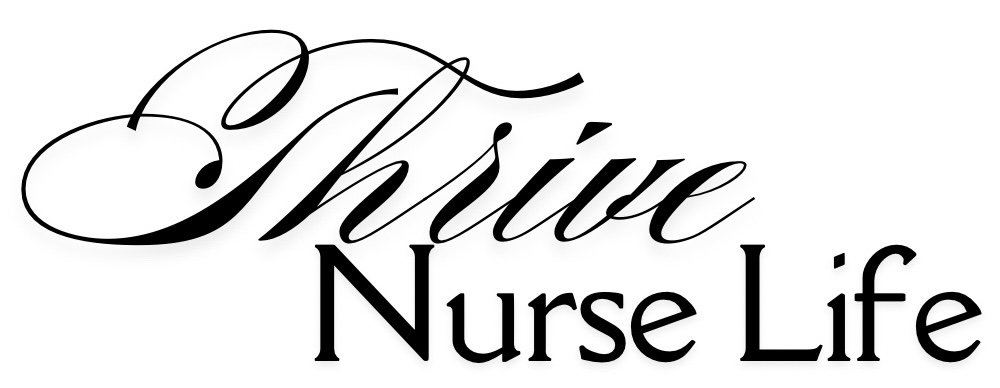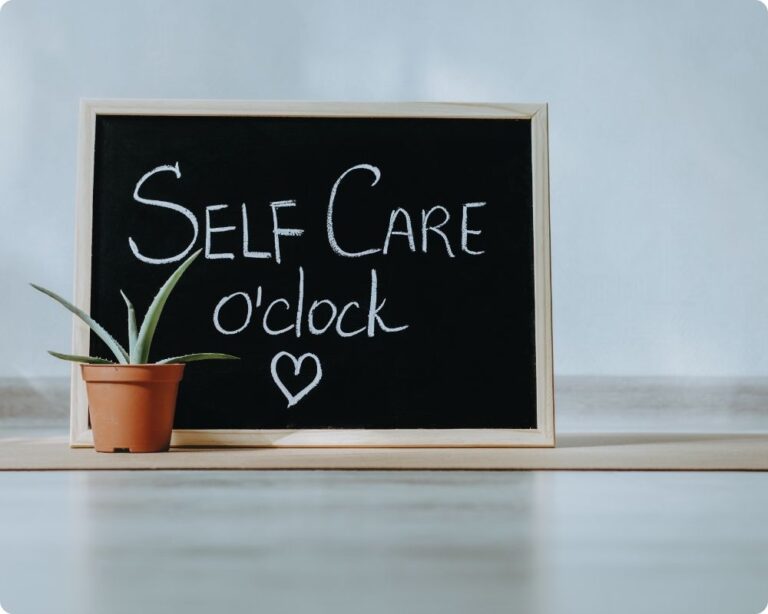Work-Life Balance in Nursing
Finding Your Sanity Between Shifts
You know that feeling when you finally clock out after a 12-hour shift, shoes glued to your feet with some mystery fluid, your stomach running purely on caffeine and hope? You get to your car, sit for a minute staring at the dashboard, and debate whether you have the energy to drive home—or if you should just live in the hospital parking lot now.
That moment—the one where you are too drained to even turn the key—is when it hits you. Work-life balance in nursing isn’t some feel-good concept; it’s a survival skill.
As ER nurses, our lives intersect with people on some of their worst days. We hold the hands of the scared, comfort the grieving, and absorb the weight of stories that stay with us long after our shift ends. The emotional toll of these moments isn’t something you can just clock out of—it lingers, taking up space in your mind and energy in your body. If we don’t learn how to separate work from home, to set boundaries between what happens in those fluorescent-lit trauma rooms and the rest of our lives, the weight of it all can pull us under.
Work-life balance isn’t about achieving perfect harmony—it’s about protecting your mental space so you can keep showing up, not just for your patients, but for yourself.
The Balancing Act: More Circus Than Science
Nursing is one of the few professions where you can work for 13 hours straight and still leave with a to-do list longer than when you started. Add in charting black holes, no call ambulance’s at shift change, and the occasional patient who thinks the call light is a direct hotline to your soul, and it’s no wonder nurses struggle to find time for anything else.
But here’s the hard truth—if you don’t create balance, the job will consume you. Not in a dramatic, Grey’s Anatomy monologue kind of way, but in the slow, creeping exhaustion that turns once-passionate nurses into overworked zombies running on stale breakroom cookies and sarcasm.
Why Work-Life Balance in Nursing Matters
Contrary to popular belief, work-life balance doesn’t mean dividing your time into neat, equal slices like a perfectly cut pie. If that were the case, most of us would be stuck with a sliver of “life” and a whole buffet of “work.” Instead, balance is about energy management—making sure that your career doesn’t drain every ounce of your mental, physical, and emotional reserves before you get a chance to enjoy the life you’re working so hard for.
So, how do you keep your nursing career from swallowing your personal life whole? That’s exactly what we’re about to dive into. Let’s talk about boundaries, stress management, and how to actually have a life outside the hospital walls—without feeling guilty about
Understanding Work-Life Balance: What It Really Means for Nurses

Spoiler Alert: It’s Not About Perfection
If you’re waiting for the day when your work and personal life exist in perfect harmony—where you leave every shift on time, get eight hours of sleep, and somehow have the energy to meal prep, exercise, and maintain an active social life—let me save you some trouble. That day does not exist.
Work-life balance in nursing isn’t about achieving some mythical equilibrium where everything fits neatly into place. If that were the case, we’d all be starring in our own self-care commercials, sipping green smoothies while basking in a stress-free glow. Instead, it’s about finding a rhythm that doesn’t leave you constantly running on fumes.
Signs You Might Be Off Balance (Hint: If You’re Reading This, You Probably Are)
Let’s do a quick self-assessment:
- Do you fantasize more about quitting mid-shift than winning the lottery?
- Has a patient ever asked if you were okay because of the “dead inside” look in your eyes?
- Is your idea of unwinding scrolling through nurse memes at 2 a.m. instead of actually sleeping?
If you answered yes to any of these, your work-life balance might need a little fine-tuning.
The Consequences of Ignoring It
When balance is off, it’s not just you who suffers—your patients, coworkers, and even the people waiting for you at home feel it, too. Nurses with poor work-life balance are more prone to burnout, job dissatisfaction, and health issues like chronic stress, fatigue, and even compassion fatigue.
The good news? You don’t have to overhaul your entire life overnight. Small, intentional changes can make a huge difference—and we’re about to dive into exactly how to do that.
Setting Boundaries at Work and Home: Because You’re Not a 24/7 Helpline

The Art of Boundaries: Because “Team Player” Doesn’t Mean “Doormat”
Ever been voluntold to pick up an extra shift? Or had a coworker ask, “Can you just cover for me real quick?” while you’re actively drowning in your own patient load? Saying no in nursing can feel borderline illegal, like you’re breaking some unspoken code of teamwork.
But here’s the truth: setting boundaries doesn’t make you a bad nurse—it makes you a sustainable one. The nurses who never say no? They’re usually the ones we find curled up in the supply closet, whispering “I’m fine” to the IV bags.
Boundaries Start with Clarity
Saying no is easier when you’re clear about what you’re saying yes to instead—your well-being, your personal time, and your longevity in the profession. If you find yourself constantly guilted into extra shifts or staying late, ask yourself:
- Is this obligation worth the mental and physical toll it will take on me?
- Will saying yes today make me resent my job tomorrow?
- Am I agreeing out of guilt or because it’s truly the right choice for me?
If the answer leans toward guilt, it’s time to start practicing professional self-preservation.
Tactical Ways to Set Boundaries Without the Guilt
- Use the Broken Record Technique: When pressured to take an extra shift, respond with a firm but polite, “I can’t this time, but I hope you find coverage.” If they keep pushing? Repeat. No need for an essay-length excuse.
- Delay Your Response: If saying no on the spot feels uncomfortable, respond with, “Let me check my schedule and get back to you.” This buys you time to make a decision that aligns with your needs—not someone else’s.
- Redefine Being a “Good Nurse”: Good nurses don’t just give their best to patients; they also protect their ability to keep showing up. Burnout doesn’t help anyone, least of all the people we’re trying to care for.
For more ways to avoid burnout and keep your nursing career sustainable, check out our post series on Compassion Fatigue in Nurses.
Your Time Off is Not an Emergency On-Call Shift
Work follows nurses home in ways other jobs don’t. You replay difficult cases, worry about patients, and mentally troubleshoot problems long after your shift ends. But your personal time is just that—personal. If your phone rings with a “Can you come in?” on your day off, remind yourself: you are not a backup plan.
Protecting your time off means:
- Silencing work notifications (yes, you’re allowed to)
- Resisting the urge to check the schedule to see who’s working short
- Not feeling guilty for prioritizing your own recovery
Boundaries aren’t barriers; they’re safeguards. And the nurses who set them? They’re the ones who stick around for the long haul—without resenting every shift they walk into.
Stress Management and Recharging Between Shifts: Because Coffee Isn’t a Coping Strategy

Nursing Without Self-Care Is Just Slow Burnout
You know that nurse who somehow seems unbothered no matter how chaotic the shift gets? The one who actually takes their lunch break and doesn’t look like they’re questioning all their life choices by hour ten? That’s not luck—it’s stress management.
Too many nurses treat self-care like a luxury instead of what it really is: an essential survival tool. If your idea of stress relief is collapsing into bed and hoping for the best, it’s time to rethink your strategy.
Micro Self-Care: Because You’re Too Busy for a Spa Day
Big self-care ideas (vacations, full-on spa retreats, actually finishing a meal while sitting down) are great, but most nurses don’t have that kind of time. Instead, try micro self-care moments—quick, effective ways to reset:
- The 30-Second Shake-Off: When you leave a rough patients room, literally shake it off (Yes! Let your inner Swifty out!). It helps your nervous system reset.
- The 4-7-8 Breathing Trick: Inhale for 4 seconds, hold for 7, exhale for 8. Calms your racing brain faster than scrolling TikTok.
- Hydration That’s Not Coffee: Gasp! Shocking, I know. But dehydration = exhaustion, and you can’t run on caffeine alone (though we all try).
Prioritizing Sleep and Movement (Even When You’re Exhausted)
Sleep and exercise are the first things to go when shifts get brutal—but they’re also the best stress management tools you have. Even a 10-minute walk or some stretching before bed can help your body decompress.
Need more ideas for quick stress relief? Check out this science-backed guide to stress management from Harvard Health. Because yes, even nurses need evidence-based self-care.
Scheduling Strategies for a Better Work-Life Flow: Because “Winging It” Isn’t Working

Your Schedule Should Work for You—Not the Other Way Around
Ever looked at your schedule and wondered who in staffing management secretly hates you? The dreaded back-to-back-to-back shifts, the random day off in the middle of nowhere, or the cruel trick of working nights one week and days the next?
While you can’t always control your schedule, you can control how you structure your time outside of it. And no, that doesn’t mean filling every second of your day off with errands and obligations.
Time Blocking: Your New Best Friend
Time blocking isn’t just for corporate people with color-coded planners—it’s actually a lifesaver for nurses. Instead of hoping you’ll magically find time for yourself, schedule it like a non-negotiable shift:
- Personal Priorities First: Block time for self-care, family, or hobbies before filling in work obligations.
- Themed Days: Use your days off strategically—one for errands, one for actual rest. Stop trying to do everything in one day.
- Plan Your Wind-Down Routine: Yes, Netflix counts, but aim for a bedtime ritual that helps you recover instead of just pass out.
How to Maximize Your Days Off Without Overcommitting
Raise your hand if you’ve ever said yes to plans on a post-shift day, only to regret everything when the exhaustion hits. Stop treating your days off like a to-do list. Give yourself permission to:
- Say No to Social Guilt: Your real friends will understand if you need a recharge day.
- Batch Your Life Admin Tasks: Knock out groceries, laundry, and appointments in one go instead of spreading them out all week. Set aside a dedicated day to tackle errands efficiently—less chaos, more free time. Bonus points if you make it enjoyable by listening to a new book or revisiting an old favorite on audiobook. Audible is a solid go-to!
- Actually Rest: If you treat downtime like wasted time, burnout will catch up with you faster than a patient hitting the call light right after you leave the room.
Small Shifts, Big Impact

Work-Life Balance in Nursing Isn’t a Myth—It’s a Strategy
If you’ve made it this far, congratulations—you’ve successfully prioritized reading about work-life balance, which is already a step in the right direction. The real challenge? Actually implementing it.
Let’s be real: no magic formula will suddenly make nursing feel effortless. You’re still going to have chaotic shifts, patients who think the call light is a personal concierge service, and charting that never ends. But small, intentional changes can mean the difference between feeling like a functional human versus a burnt-out shell of your former self.
Your Work-Life Balance Game Plan
To recap, here’s how you can start reclaiming your time and energy:
- Redefine Balance: It’s not about perfection—it’s about managing your energy so work doesn’t consume your entire life.
- Set Boundaries Like a Boss: Saying no is self-preservation, not selfishness. Your time off is yours.
- Manage Stress in Real Time: Micro self-care moments and sleep matter more than you think (yes, even more than coffee).
- Get Smart About Scheduling: Stop winging it—structure your days off so they serve you.
Now, Over to You
The best time to start making changes? Right now. Pick one strategy from this post and try it this week. Maybe it’s setting a boundary, prioritizing actual rest, or not feeling guilty for ignoring your phone on a day off.
What’s your biggest struggle with work-life balance in nursing? Drop a comment below—I’d love to hear what’s worked (or hasn’t) for you. Because let’s be honest, no one understands nurse life better than other nurses.






